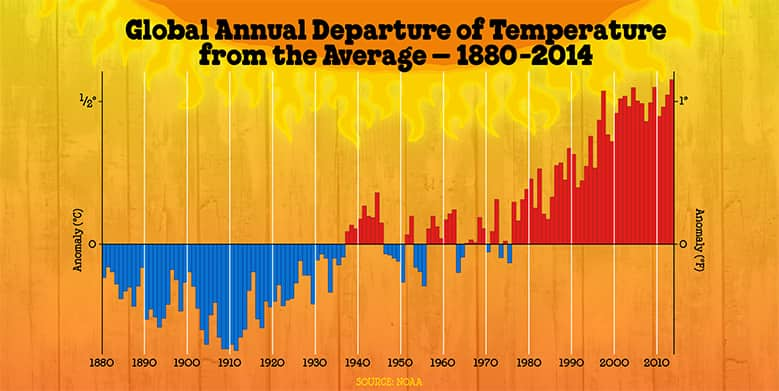March 5, 2015
Everyone loves to talk about the weather, but this is getting extreme. We’re still hearing reports on how last year was record-breaking for severe temperatures and weather around the world. The headline of course is that 2014 was the warmest ever, according to separate reports from both the National Aeronautics and Space Administration and the National Oceanic and Atmospheric Administration. Global average temperature over land and ocean was 58.4 degrees Fahrenheit— 1.24 degrees Fahrenheit more than the 20th century average.

Now, a new analysis from the UN World Meteorological Organization makes clear that this latest superlative is just part of a broader trend: 14 of the 15 warmest years since we started keeping records have occurred since 2000. Most scientists agree that rising concentrations of carbon pollution are a key factor in driving temperatures upward.
TAKE ACTION NOW: Sign the petition for clean energy!
The implications are widespread. We are moving into a new temperature paradigm— meteorologists are noting that anyone younger than 29 hasn’t experienced a whole month where the average temperature was lower than the 20th-century average. Some of the impacts from this steadily warming planet follow a generally linear trend: Arctic sea ice, for example, has been consistently shrinking since 1978.
Overall, the results of ramped up warmth were pretty wild in 2014. Canada had its coldest year since 1996, while Alaska experienced their warmest year on record. Australia had its warmest spring on record. Japan sloshed through its wettest August since 1946, while South Africa experienced the worst drought since 1933. Among the swings in temperature documented around the world, one constant was that record highs were noted on every continent.
Winter 2015 has already brought walloping snowstorms here in the Northeastern United States, shattering records in cities like Boston where 72 inches of snow fell over 30 days. Climate scientists are linking warmer ocean water with an increased potency of these “nor’easter” storms, which produce energy from the differing temperature of rigid arctic air and warmer Gulf Stream waters.
Our planet’s complex weather systems are reacting to warmer overall temperatures, and that reaction is increasingly volatile. Climate scientists are considering that these weather extremes may be a preview of what’s to come as we crank up the temperature inputs. The Intergovernmental Panel on Climate Change’s latest report states that if we don’t curb carbon emissions to zero by 2100, we’ll be locked into a cycle of catastrophic warming. Here’s what we can, and are doing already to avoid a future where hot and wild are the new norm.
Join The Climate Movement
-
With a landmark climate action agreement in place including commitments from 196 countries to fight climate change, now is the time to keep the pressure on and ensure swift action. This climate agreement wouldn’t have happened without millions of people around the world taking action. And we won’t be able to meet the ambitious goals of the Paris Agreement without millions and millions more people taking action in support of a rapid transition to clean energy. Paris was just the beginning, not the end. Let’s get to work towards a greener, cleaner future. Add your voice to the millions demanding action and sign the petition today!